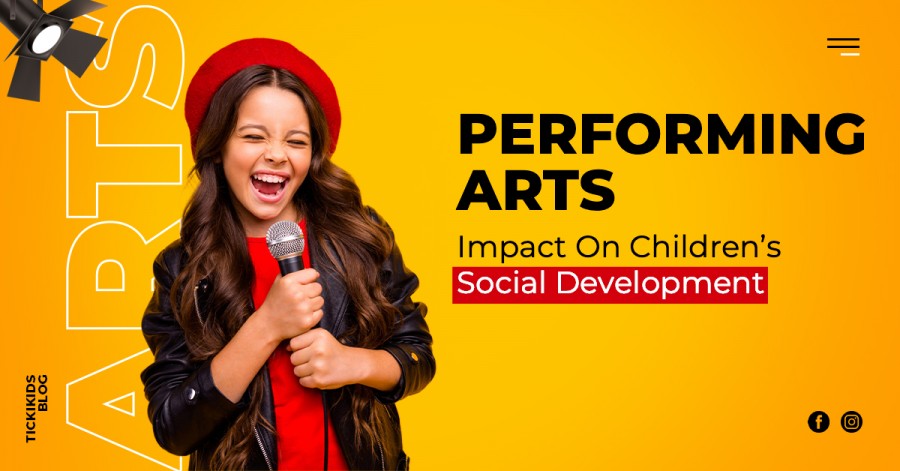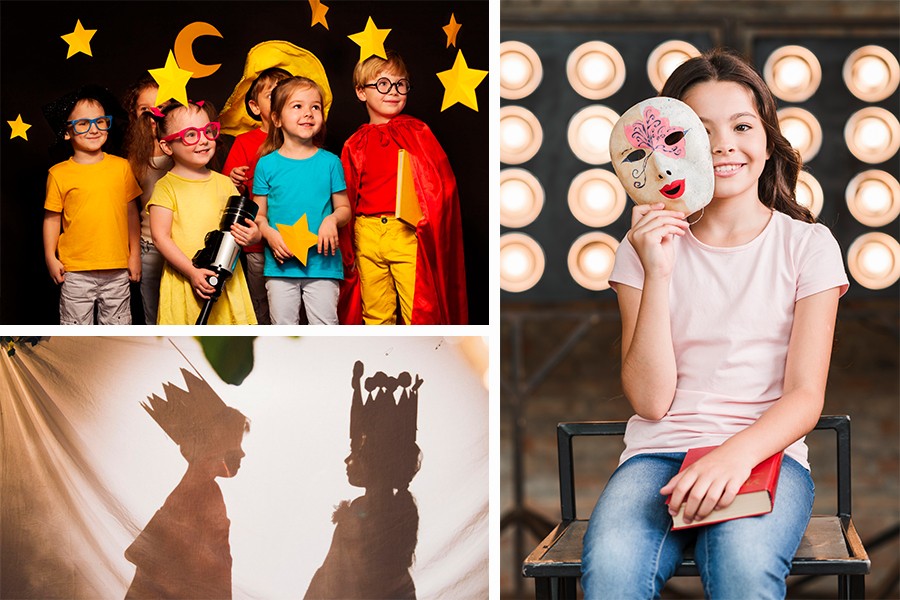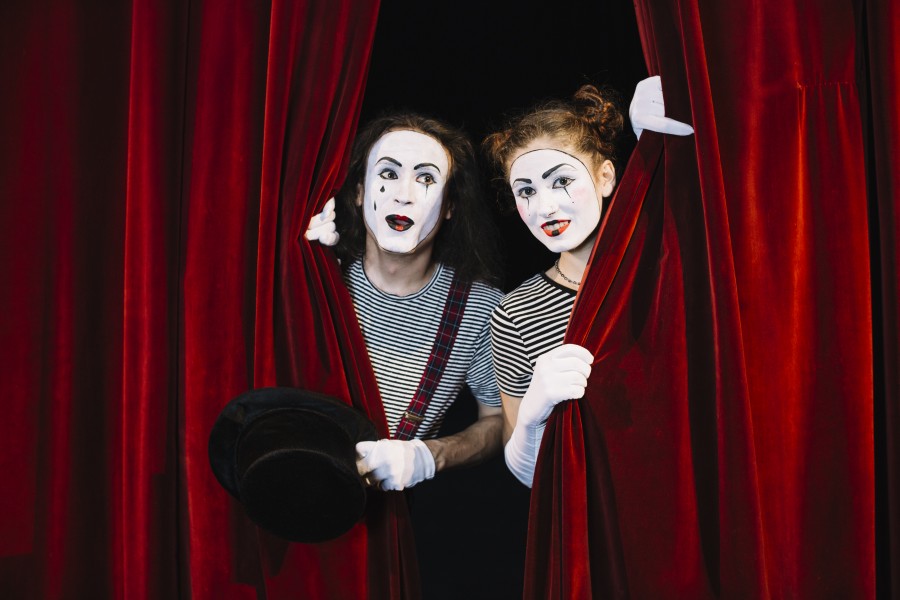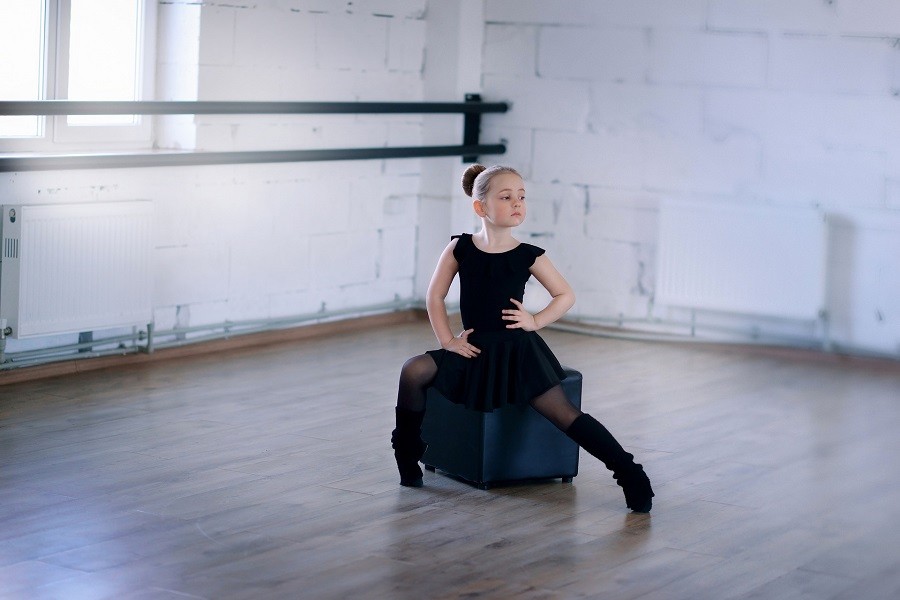Performing Arts Impact On Children’s Social Development
Published 19 August 2021 at 11:56
Tickikids Blog Singapore > Digest > Performing Arts Impact On Children’s Social Development

Since antiquity, performing arts were and are an inevitable part of education that ensures all-round and harmonious development of the individual. Even now, when much prominence is given to STEM subjects, performing arts remains an important part of the curriculum. Now and then various researches highlight the role of performing arts in the development of creative and communicative skills, imagination, self-esteem, and even improve academic performance.
Find more ideas: Our Guide for Best After-School Activities for Kids in Singapore
So, what are the performing arts?
These disciplines involve all kinds of activities that involve performance in front of the audience. These may be:
- Dancing
- Acting and theatre
- Singing, etc.

Photo Credit: www.freepik.com, stock.adobe.com.
What is the best age to start performing arts for kids?
First and foremost, all kids are different and they may opt for different performing art, and that’s perfectly fine. As a parent, you have to pay attention to the personal preferences of your child as the activity should be interesting to your kid in the first turn. But when to start?
Many parents see cute children actors in TV ads or on the stage and decide to start their toddlers out in a theatre. One may say, why not, after all, for babies performing and mimicking is a natural way of world cognition. However, not all activities are appropriate for too young children.
For example, Maria Montessori insisted that the best age to start learning music is between 3 and 7 years. And many studies that explore the theme of a “window of opportunity” acknowledge this fact. The point is, neural pathways associated with processing and understanding music are still forming at this age and it will be easier for kids to learn the basics.
Dancing is a different story. Starting formal lessons too early can be harmful in the long run, so it is better to wait at least for the elementary school.

Photo Credit: www.freepik.com
Can performing arts improve the learning experience?
Yes and then some! A vivid example: playing music uses the same cortical regions that teens use to process algebra. Another report created by The Arts Education Partnership based on 62 studies shows that kids who participate in performing arts activities achieve better results in reading, writing, and math comparing to children who skip these activities and focus on academics.
There are many reasons for such results apart from brain development. Performing arts allow children to experiment, explore different points of view, reach conclusions using several approaches. Kids use this approach to other disciplines and thus achieve better results. Also, they are more disciplined, as music, dancing, and similar activities require a lot of practice, dedication, and commitment. Yes, the routine may be daunting, however, kids see the progress and understand the importance of such exercises. Hence, young performers apply this learning technique to all school disciplines. Needless to say that the organized nature of studying is beneficial to any subject!
Performing arts boost soft skills
Alas to all STEM admirers, the recent Future of Jobs report stated that the demand for tech-related skills will decline soon and soft skills will come to the fore. Luckily, performing arts do a great job of boosting collaboration, communication, creative skills, and emotional intelligence.
Any theatrical performance is possible without collaboration. It is a result of the well-coordinated work of actors, directors, and stagehands. The music performance will be disastrous without the concerted efforts of an orchestra and a director. Children learn to be team players at a young age and will use this skill in adulthood. Besides, different activities develop communication skills differently:
- Young actors improve their public speaking skills and learn to read body language;
- Musicians learn to listen and read non-verbal clues;
- Dancers learn how to express emotions through movements, so, they are well-versed in the expression of feelings.
Naturally, creativity is the basis of performing arts. And the combination of these factors makes the development of emotional intelligence inevitable. Children learn to show empathy, communicate with peers and adults, and think constantly about the things they have learned.
And do not forget about bonding! Often it may result in the collaborations that kids create on their own: they may make a play, or form a band, or bring out a dancing performance. And this bonding can last a lifetime.
Performing arts relieve stress
It is hard to find an adult who won’t be nervous when speaking in front of colleagues. Acting kids know that performance jitters are an absolutely normal feeling and they learn how to cope with it. Plus, children receive a possibility to express feelings and work out emotions in a safe environment. Such role plays help kids investigate and better understand their reactions to different situations or ideas.
Performing arts can be considered a great physical activity, especially when it comes to dances. Today outdoors performing activities at schools have become quite popular, so it is a chance to combine the useful with the pleasant: get creative, get rid of anxiety, and spend some time in the fresh air.
Kids learn to solve problems and think quickly
Performing arts offer new ways of thinking that children use to solve problems not just on stage but in academic and real-life also. Every new role or task is a new challenge that the young performer has to address and find an appropriate solution.
Another important skill is improvisation and the ability to think on their feet. Children learn to minimize errors and get back on track without turning performance into a disaster. In the future, this skill will help them to expect the unexpected and be ready for everything.

Photo Credit: Pixabay
Boosting self-esteem and confidence
Performing arts offer the most appropriate way of receiving criticism and learning from it. The feedback that young performers get is constructive, not negative, so it won’t hurt their self-esteem. On the contrary, kids start to see their weaknesses and strengths and try to improve them.
Besides, the instant positive feedback from the audience during the performances gives a huge boost to self-esteem. Add here a sense of personal responsibility in the success of group activity and it becomes clear why performing arts are called the most efficient activities for improving confidence and self-esteem.
No matter what kind of performing arts kids choose, such an activity will be very beneficial for them! It is hard to imagine a discipline that can influence a child’s social, emotional, and educational development more than performing arts.
So discuss it with your kid, choose the activity he or she likes and onwards and upwards! Our city has many places where your kids can boost imagination, develop acting and communicative skills and have a great pastime!
For example, here is the biggest improvised theatre company and training center in Singapore - The Improve Company.
Hundreds of students have already tried and tested their improvisational skills and creativity on the stage of The Improv Company, and every time coaches prepare something special and catching for them!
This October teens can learn the basics of improvisational theatre during the 4-days course.
Here, each day will be dedicated to one core aspect of the improv and students will use their knowledge from the previous day to make short scenes and theatre games on the last day.
Participants of the course will learn to listen actively, support the partner, be bold, be a team player, learn acting techniques and give full reign to their imagination!
This course is filled with engaging activities, fun, and creativity! Teens will learn how to express themselves, boost their imagination and create wonderful stories with their fellow improvisers.
Bring into the notion that according to COVID restrictions the group will be 8 participants maximum, so do not hesitate to subscribe!
And make sure that kids wear something comfortable as they should be free to move.
When: 11 - 14 October, 18 - 21 October
Timing: 9.00 am - 12.00 pm.
Age: 12 - 17
Fees: SGD350 (10% discount for group signups).
Contacts: tel. +65 8800 0651
Location: 62B South Bridge Road, Singapore 058692.
Find Out More